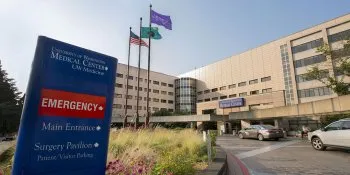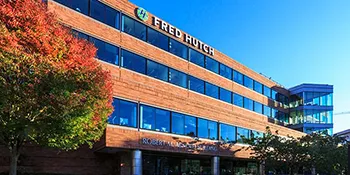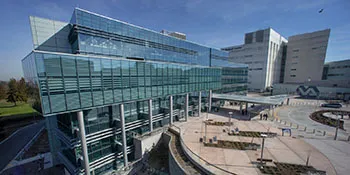The University Of Washington Plastic Surgery program offers residents a comprehensive and diverse training experience across a network of leading healthcare institutions in the Seattle region. This multi-site approach is crucial for exposing trainees to a wide array of cases, patient populations, and surgical techniques, forming a robust foundation for future careers in plastic and reconstructive surgery. By rotating through these varied settings, residents gain invaluable experience in managing complex surgical problems, from acute trauma to intricate reconstruction and aesthetic procedures, all under the guidance of expert faculty within the esteemed University Of Washington Plastic Surgery division.
Training Opportunities with University Of Washington Plastic Surgery at Harborview Medical Center
Harborview Medical Center stands as a cornerstone for the University Of Washington Plastic Surgery training, particularly in acute and complex reconstruction. As the only designated Level I adult and pediatric trauma and regional burn center in the state of Washington, Harborview serves a vast referral area covering Alaska, Montana, and Idaho. It also functions as the disaster preparedness and control hospital for Seattle and King County.
Harborview is renowned for caring for a highly diverse patient population, including uninsured or underinsured individuals, providing residents with exposure to a broad spectrum of demographics and clinical presentations.
Clinical Experiences at Harborview
Plastic surgery clinical experiences here are intensely focused on trauma and complex reconstruction. Residents gain significant expertise in managing maxillofacial trauma, hand trauma, and burn injuries. Training also includes reconstruction of injuries to the lower extremities and trunk, as well as advanced microsurgical reconstruction techniques essential for restoring form and function after severe injury or disease.
University Of Washington Plastic Surgery Training at UW Medical Center-Montlake
UW Medical Center-Montlake is consistently ranked among the top hospitals nationally and in Washington State. It serves as a world-class tertiary referral academic health center, attracting complex cases from around the globe and providing residents within the University Of Washington Plastic Surgery program access to cutting-edge procedures and multidisciplinary collaboration.
What to Eat in Fort Worth – A Culinary Deep Dive
11 Must-Visit places to go in nevada for Your 2025 Trip
12 Unforgettable Fun Things to Do in Vegas for Couples
This facility is dedicated to delivering exceptional, patient-centered care and training the next generation of medical professionals using the latest technology.
Plastic Surgery at UWMC-Montlake
At UW Medical Center-Montlake, plastic surgeons affiliated with the University Of Washington Plastic Surgery program are deeply involved in oncologic reconstruction, focusing on restoring anatomy and function after cancer removal. Breast reconstruction is a significant part of the practice here, alongside general plastic surgical reconstruction and aesthetic surgery, offering residents a broad view of the field’s reconstructive and cosmetic aspects.
 Exterior view of UW Medical Center Montlake, a key site for University Of Washington Plastic Surgery training.
Exterior view of UW Medical Center Montlake, a key site for University Of Washington Plastic Surgery training.
Exploring Care at UW Medical Center-Northwest with University Of Washington Plastic Surgery
UW Medical Center-Northwest is a comprehensive medical center located in North Seattle, providing a range of emergency, inpatient, and outpatient services. This site offers a different environment compared to the tertiary centers, emphasizing community-based, personalized care within a large non-profit hospital setting.
With 281 beds and over 2,000 employees, it provides technologically advanced, patient-centered care delivered by a world-class medical staff.
Care Provided at UWMC-Northwest
Plastic surgeons at UW Medical Center-Northwest contribute to the comprehensive training provided by the University Of Washington Plastic Surgery program by focusing on specific areas. Residents gain experience in treating hand pathologies, performing breast and abdominal wall reconstruction, gender-affirming surgery, and managing a variety of other reconstructive surgical problems.
University Of Washington Plastic Surgery Program at Fred Hutch Cancer Center
Fred Hutch Cancer Center is recognized as a leading cancer center in the U.S. and the top facility in the Pacific Northwest. As Washington state’s only National Cancer Institute (NCI)-designated comprehensive cancer center, it provides an essential component of the University Of Washington Plastic Surgery training by focusing on cancer-related reconstruction.
Fred Hutch combines powerful scientific research with compassionate clinical care, creating an environment where cutting-edge discoveries are translated into patient treatments.
Focus at Fred Hutch
The plastic surgery involvement at Fred Hutch Cancer Center within the University Of Washington Plastic Surgery training is primarily centered on reconstruction following cancer treatment. This specialized training ensures residents are proficient in restoring function and aesthetics for patients who have undergone significant tissue removal due to cancer, highlighting the critical role of reconstructive surgery in comprehensive cancer care.
 Exterior photo of the Fred Hutch Cancer Center building, a vital site for cancer reconstruction training within University Of Washington Plastic Surgery.
Exterior photo of the Fred Hutch Cancer Center building, a vital site for cancer reconstruction training within University Of Washington Plastic Surgery.
Pediatric Training at Seattle Children’s Hospital through University Of Washington Plastic Surgery
Seattle Children’s Hospital is a major academic referral center for pediatric and adolescent medicine serving a vast region including Washington, Alaska, Montana, and Idaho. For residents in the University Of Washington Plastic Surgery program interested in or specializing in pediatric cases, this site is indispensable.
The hospital is dedicated to providing superior patient care and advancing medical knowledge through pediatric research, covering the largest geographic area of any children’s hospital in the country.
Pediatric Plastic Surgery at Seattle Children’s
The Plastic Surgery Service at Seattle Children’s Hospital provides specialized care for congenital anomalies of the head and neck. This includes conditions like cleft lip and palate, craniosynostosis, and other craniofacial differences. Residents gain comprehensive experience across all other aspects of pediatric plastic surgery, addressing unique reconstructive and cosmetic needs specific to growing children and adolescents.
University Of Washington Plastic Surgery and VA Puget Sound Health Care System
The VA Puget Sound Health Care System has a long history of excellence in teaching, research, and patient care for Veterans. As a university-level VA and a regional referral site for the Northwest, it provides care for Veterans from a wide area.
Its reputation for innovation and high-quality care makes it a valuable training location for the University Of Washington Plastic Surgery residents.
Plastic Surgery at VA Puget Sound
The plastic surgery practice at the VA Puget Sound Health Care System exposes residents to a broad spectrum of adult plastic surgery cases. This includes reconstructive procedures addressing conditions common in the Veteran population. While it covers most aspects of the field, the focus is on adult care, excluding pediatric and acute trauma cases which are covered extensively at other UW sites.
 Exterior view of VA Puget Sound Health Care System, a training location for adult plastic surgery within University Of Washington Plastic Surgery.
Exterior view of VA Puget Sound Health Care System, a training location for adult plastic surgery within University Of Washington Plastic Surgery.
Contribution of Valley Medical Center to University Of Washington Plastic Surgery Training
Valley Medical Center adds another dimension to the training landscape for the University Of Washington Plastic Surgery program. Founded in 1947, it is a 321-bed acute care community hospital and the oldest and largest public hospital district system in Washington State.
Serving over 600,000 residents in Southeast King County, Valley Medical Center provides residents with experience in a busy community hospital setting, broadening their exposure to common plastic surgery needs outside of major referral centers.
Rotations in the University Of Washington Plastic Surgery Program
Residents in the University Of Washington Plastic Surgery program begin rotating through various plastic surgery services early in their training, even as interns. This early exposure is complemented by rotations on other surgical services and critical care units, such as orthopedics, burn, acute care general surgery, vascular surgery, and trauma ICU, typically through their R3 year. These diverse experiences are designed to cultivate well-rounded surgical skills. Starting in the R4 year, residents focus exclusively on plastic surgery services, rotating through the major hospital sites and select local private practices to gain a full spectrum of complex and elective cases.
Conferences Supporting University Of Washington Plastic Surgery Education
A crucial element of the University Of Washington Plastic Surgery training is the robust conference schedule. Residents attend weekly plastic surgery didactic conferences every Wednesday, regardless of their current rotation. Additionally, each hospital site hosts its own weekly lectures tailored to the cases and specialties present at that location. These conferences utilize various formats, including presentations by attending faculty, resident presentations, small case discussion groups, and in-service question review sessions. A dedicated Didactic Conference Planning Committee, composed of residents and faculty, reviews and updates the curriculum annually, incorporating resident feedback to ensure comprehensive coverage of all necessary topics and optimal scheduling.
Frequently Asked Questions about University Of Washington Plastic Surgery Training
What types of clinical experiences are available at the University Of Washington Plastic Surgery training sites?
Training encompasses a wide range of plastic surgery subspecialties, including maxillofacial trauma, hand trauma, burns, lower extremity and trunk reconstruction, microsurgery, oncologic reconstruction, breast reconstruction (both reconstructive and aesthetic), general plastic surgical reconstruction, aesthetic surgery, hand pathologies, abdominal wall reconstruction, gender affirming surgery, congenital head and neck anomalies, and other pediatric plastic surgery needs.
Which hospitals are part of the University Of Washington Plastic Surgery training program?
The program includes rotations at Harborview Medical Center, UW Medical Center-Montlake, UW Medical Center-Northwest, Fred Hutch Cancer Center, Seattle Children’s Hospital, VA Puget Sound Health Care System, and Valley Medical Center.
Does the program include training in pediatric plastic surgery?
Yes, the University Of Washington Plastic Surgery program includes dedicated training in pediatric plastic surgery at Seattle Children’s Hospital, covering congenital anomalies of the head and neck and other pediatric cases.
When do residents begin specializing solely in plastic surgery rotations?
Residents rotate through other surgical specialties (orthopedics, burn, general surgery, vascular, trauma ICU) in their early years (up to R3). Starting as R4s, they rotate exclusively through plastic surgery services across the participating sites and private practices.
